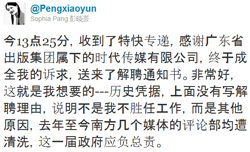New York, March 30, 2011–The Committee to Protect Journalists is concerned by the dismissal of two Guangzhou-based journalists who advocate for political reform amid tightening restrictions on free expression. While several bloggers and activists have disappeared or been detained in the last month after anonymous calls for demonstrations in support of political reform were published online, journalists in traditional media are now also being targeted, CPJ said.
Time Weekly opinion editor Peng Xiaoyun reported on her Twitter account Monday that she had received an official dismissal notice from the Time Weekly company, which operates under the Guangdong Provincial Publishing Group. International news reports said Peng had taken “involuntary leave” in January after including controversial figures, such as jailed food safety advocate Zhao Lianhai, in a December 2010 retrospective of 100 influential contemporary figures.
In a separate case, outspoken Southern Weekend commentator Chen Ming, who publishes under the name Xiao Shu, also announced Monday via his local Sina microblog that he was taking a two-year sabbatical. The term “sabbatical” was likely a euphemism for permanent notice since journalists have to resign after six months on leave, U.S. government-funded Radio Free Asia reported. The Hong Kong-based South China Morning Post confirmed the news with an unnamed former colleague of Chen’s.
RFA said the weekly, which is published by the Southern Media Group, had withdrawn Chen’s column in 2010. Hong Kong University’s China Media Project website published an example of his writing in October 2010 titled “Anyuanding, and why political reform can’t wait.” The Southern Media Group also let high-profile commentator Zhang Ping, who writes under the pen name Chang Ping, go in January after pressure from local propaganda authorities.
“In their drive to stifle public discussion, China’s propaganda authorities are depriving the people of some of the country’s most forward-thinking opinions,” said Bob Dietz, CPJ Asia program coordinator. “Not just bloggers and activists who straddle the realms of politics and journalism, but mainstream journalists who have long operated in traditional Chinese media are now being targeted.”
Dismissals, reshuffles, and fines are used as punitive measures against professional journalists and editors who flout government reporting restrictions or are perceived as consistently critical, according to CPJ research. Authorities rarely provide specific reasons for the action. Peng Xiaoyun’s notice did not explain the motive for discharging her, she said on Twitter. Because those involved often downplay reprimands to preserve their jobs, the causes and effects of the practice are difficult to monitor. Chen Ming declined an interview with RFA.
Zhang has done interviews about what happened since he was sacked, including with a supplement of Hong Kong’s Ming Pao newspaper and with Beijing-based English-language media blog Danwei. Before losing his position, he told Danwei, “The newspaper demanded that I don’t take any interviews, and I was willing to compromise in order to have the opportunity of staying at the newspaper. This time I have been told to leave the newspaper, naturally I don’t have that layer of restraint.”
